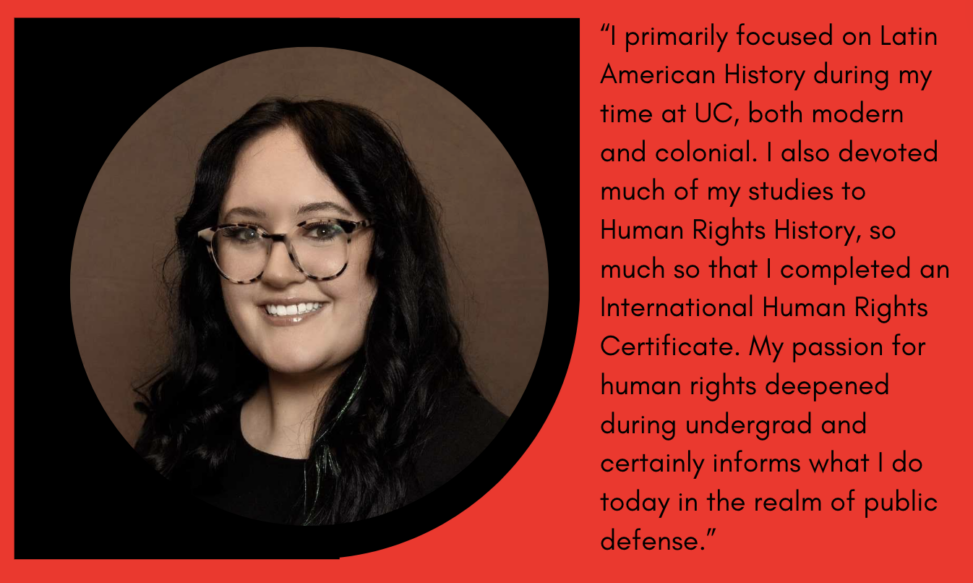I’m a Cincinnati native—now Kentuckian—who just graduated from UC College of Law. I also received a BA in History from UC in the spring of 2019, making me a ‘Double Bearcat.’ When I’m not working (or sleeping), I’m either reading fantasy books, baking bread, or fussing over my dogs.
As a history major, I won the Hilda L. Smith prize for my capstone, “Agency and Indigeneity: Indigenous Women Before the Law in Early Colonial Spanish America,” the Arts & Sciences College’s Spirit of Community Award (nominated by the UC History Faculty), and the History Club Service and Leadership Award for which I served as President in 2018 and 2019.
What are you up to these days?
I’m a law clerk at the Kenton County Public Defender’s Office in Covington, Kentucky! I represent indigent criminal defendants and handle various dockets, such as adult misdemeanors, juveniles, mental health, and child support. Upon admission to the Kentucky Bar, I will be promoted to a staff attorney position.
As mentioned, I graduated from UC Law in 2023, and began this job shortly thereafter. In law school, I was a litigation fellow at the Ohio Innocence Project and a member of the Indigent Defense Clinic at Hamilton County Public Defender. I also interned at Kenton County Public Defender during my time at UC Law, where I tried a misdemeanor case before a jury and represented clients in felony probation revocation hearings using my limited license.
What brought you to history at UC?
I acquired a passion for history in high school and automatically knew I wanted to major in it at college. Landing at UC was an easy decision, especially since I grew up in Cincinnati. After researching the various history classes offered by UC, my mind was made up!
What did you focus on as a history student at UC?
I primarily focused on Latin American History during my time at UC, both modern and colonial. I also devoted much of my studies to Human Rights History, so much so that I completed an International Human Rights Certificate. My passion for human rights deepened during undergrad and certainly informs what I do today in the realm of public defense.
Did you have any favorite history courses? Which ones and why?
Cold War in Latin America – Dr. Isaac Campos sparked my interest in Latin American History with this course, particularly as it related to the various human rights crises in the Southern Cone during the Cold War Era. This would inspire me to focus my first history capstone on this subject.
Drugs in the Americas – This course [also with Dr. Campos] has informed much of my current line of work, as I presently operate within a system of mass incarceration, largely because of the War on Drugs. In this course, I learned of the historical origins of current public health crises in the U.S., particularly as it relates to its racialized and punitive nature. This understanding assists in my client-centric representation of individuals caught up in this punitive system.
Witchcraft and Early American Religions – Dr. Erika Gasser did an excellent job weaving primary and secondary sources together in this course. Not only was the subject matter of this class one of the most interesting areas of study I got to experience during my time at UC, but it also strengthened my writing and analytical skills.
Human Rights in History – This course was co-taught by two of my favorite professors at UC – Dr. Stephen Porter and Dr. Susan Longfield Karr. This joint effort was a treat to experience. This class was challenging and thought-provoking, and I find myself reflecting on many of the discussions we had in this course to this day, particularly regarding the origins of punishment and incarceration.
Race and Gender in Latin America – Dr. Brianna Leavitt-Alcántara single-handedly contributed to my love of indigenous women’s history in this course. I minored in Women’s, Gender, and Sexuality Studies and Latin American Studies at UC, so this course enveloped my interests through a historical lens. Based on this class, I did a second capstone project with Dr. Leavitt-Alcántara, which was a perfect way to round out my undergraduate career.
Thoughts and Methods – This course taught by Dr. Longfield Karr was probably one of the most challenging courses I took as a history major. However, learning to think, write, and read like a historian was incredibly beneficial. This course must have made every legal writing professor I had in law school quite frustrated, but I attribute much of my writing style today to this course.
What did you focus on in your capstone and why?
I wrote two capstones — “Relativism over Absolutism: How the U.S. Private Sector Obstructed Jimmy Carter’s Human Rights-Centric Foreign Policy Toward Chile” under the supervision of Dr. Porter and “Agency and Indigeneity: Indigenous Women Before the Law in Early Colonial Spanish America” under the direction of Dr. Leavitt-Alcántara.
These capstones were informed by the various courses I took as a history major and encapsulated the following themes: human rights, race and gender, conquest, and state-sponsored terrorism.
What skills did you pick up from studying history that have served you well beyond your courses?
The skill of writing effectively and cogently, as well as the importance of context.
Have any advice for current students?
Ask for professor feedback on your papers and go to the writing center! Being able to write effectively is an unparalleled skill. Also, join the history club 🙂

Leave a Reply